A Blueprint for the Great Beyond
The Academic Year 2018/2019 got off to a bold start with the launch of NUS' new Vision, Mission and Values, which aim to take the University to even greater heights.
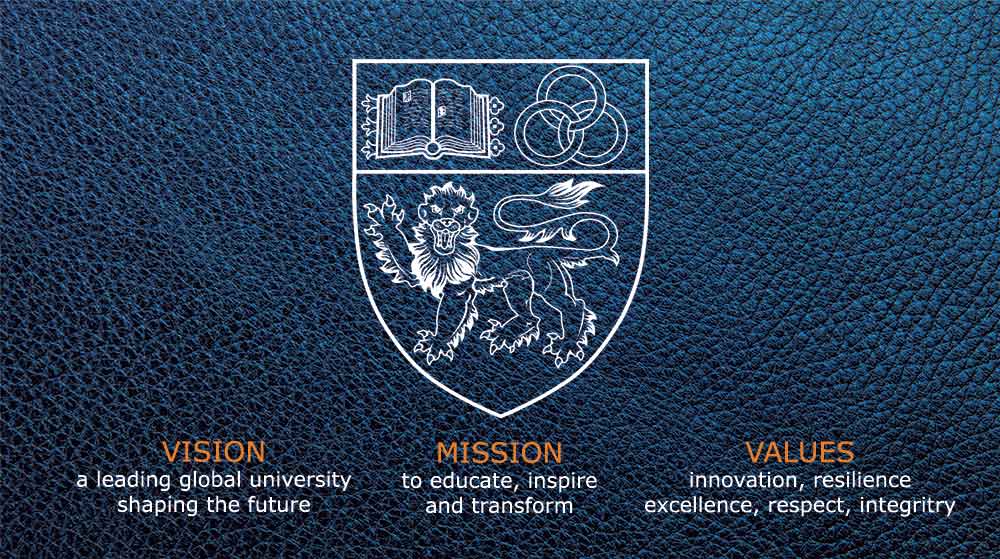
Another school year, and another new batch of undergraduates walks through the doors of NUS. This year’s freshmen kicked off their university experience in much the same way as did those before them — save for one big difference: they were the first cohort to join the University under the presidency of Professor Tan Eng Chye (Science ’85).
In conjunction with this milestone, a special event was held at the NUS University Cultural Centre on
15 August, during the first week of the semester, to launch NUS’ new Vision, Mission and Values (VMV). “Our vision was last laid out in 2009 [by then-newly-appointed NUS President, Professor Tan Chorh Chuan (Medicine ’83)],” Prof Tan tells The AlumNUS. “Since then, NUS has progressed to a level where we are now recognised as one of the top universities in Asia. So it is timely to review where we are now — and where we want to go.
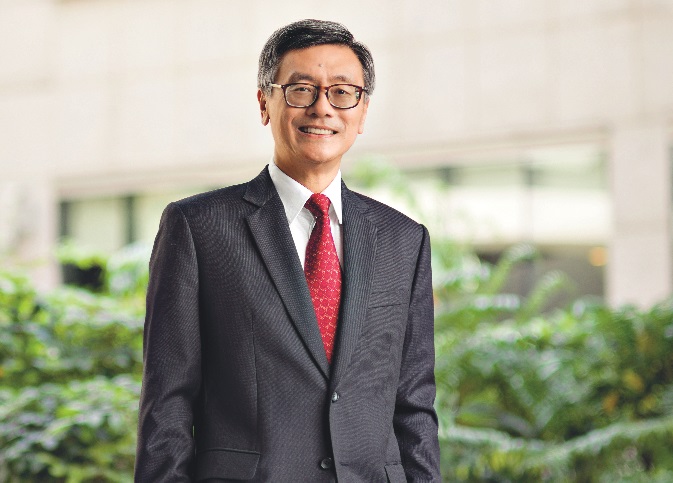
NUS has progressed to a level where we are now recognised as one of the top universities in Asia. So it is timely to review where we are now — and where we want to go.
Prof Tan Eng Chye, NUS President
FROM THE GROUND UP
The process of crafting the VMV began before Prof Tan formally assumed office as NUS President on 1 January 2018. In late 2017, he went on a listening tour around campus to engage with a wide cross-section of the NUS community — comprising faculty and senior management, researchers, staff, students and alumni — and to exchange views about NUS’ future direction. Online surveys and focus group discussions were subsequently conducted to garner more feedback. With the support of the NUS Trustees, the VMV was then crystallised and fine-tuned prior to its 15 August launch.
In all, more than 1,000 people participated in the process, making for a deeply collaborative experience. “Whereas past versions of our vision had been largely shaped by an external consultant, this time it was much more of a ground-up initiative,” says NUS Chief Communications Officer, Mrs Ovidia Lim-Rajaram (Arts and Social Sciences ’89). “It was heartening to see that so many people in our community are eager to contribute their thoughts. It showed how much they care about the University.”
The outcome is a new VMV that boldly and succinctly states the University’s goals, and that matches its stature as a 113-year-old institution which has produced many eminent leaders across government, industry and civil society. Professor Ho Teck Hua (Engineering ’85), Senior Deputy President and Provost of NUS, notes, “The VMV serves as a common language for the entire NUS community, in all its diversity, to talk about what we want to achieve and how we intend to get there.”
INTRODUCING THE VMV
A great deal of careful deliberation went into wordsmithing the VMV:
- The Vision reflects how NUS is embracing its role as a leading global university; it has reached a position to be able to shape the future.
- The Mission highlights three objectives:
- to Educate students, which is and always will be at the core of what NUS does;
- to Inspire a community of talents to create positive societal impact; and
- to Transform the world and make a difference beyond incremental change.
- The Values encapsulate the “NUS DNA”, as Prof Tan puts it, and should guide one’s personal conduct:
- Placing Innovation first signifies the importance of thinking about change, taking risks and being willing to accept failures.
- Resilience is about getting back up from failures and refusing to give up.
- Excellence, or reaching one’s full potential, is at the centre of everything NUS does and hence is in the middle of the list.
- Respect means treating everyone, regardless of their background, with kindness, and being open to diverse viewpoints.
- Integrity refers to having strong moral and ethical convictions.
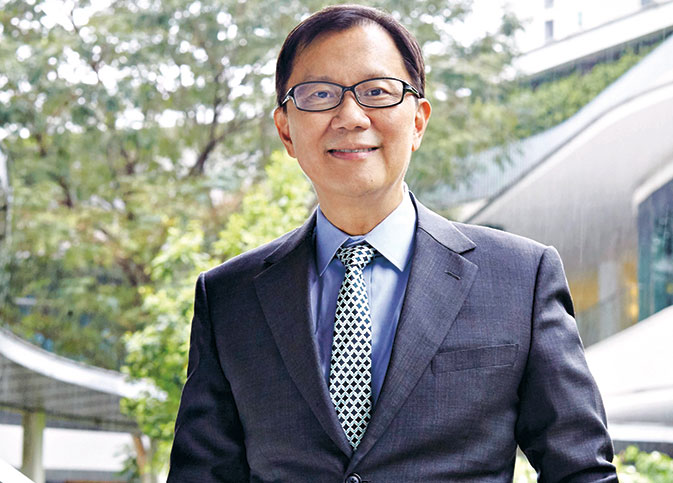
The VMV serves as a common language for the entire NUS community, in all its diversity, to talk about what we want to achieve and how we intend to get there.
Prof Ho Teck Hua, NUS Senior Deputy President and Provost
This marks the first time NUS has launched its value system, alongside its vision and mission. “Making our values explicit allows people both from within and outside the NUS community to better understand what we stand for,” says Mrs Lim-Rajaram. She also draws attention to the use of blue and orange — NUS’ colours — as well as the inclusion of its coat of arms on the VMV poster. “Our coat of arms appears on the degree scrolls of graduates, so having this emblem on the poster connects the VMV to the University’s legacy and to all NUS students, past, present and future.”
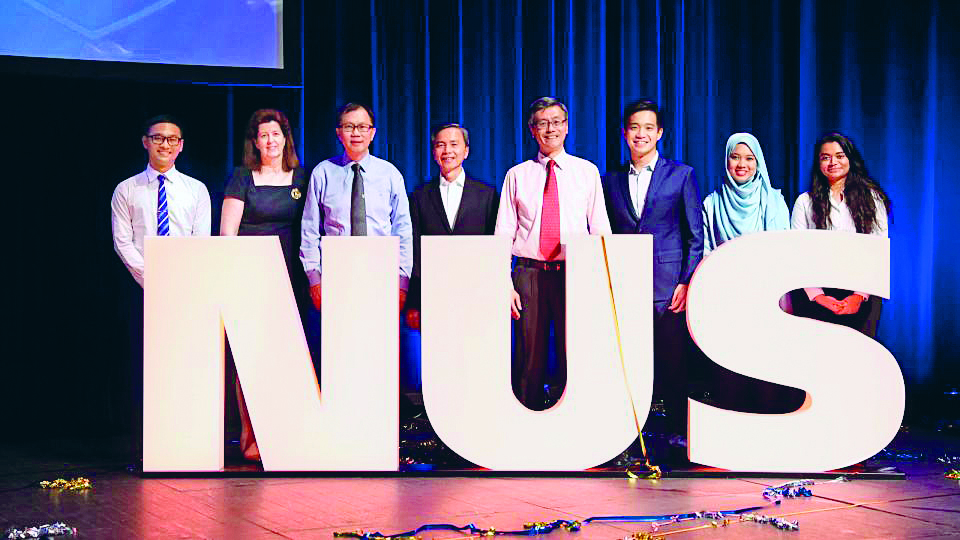 Participating in the VMV launch were (from left) Mr Jeffrey Lee, President, NUS Students’ Union; Assoc Prof Marie-Veronique Clement, NUS Medicine; Prof Ho; Mr Hsieh Fu Hua (Business ‘74), NUS Chairman; Prof Tan; Mr Lim; Ms Nur Amalina Mohamed, University Scholars Programme; and Ms Drashtiben Mukeshbhai Patel, NUS Computing and NUS Overseas College Silicon Valley.
Participating in the VMV launch were (from left) Mr Jeffrey Lee, President, NUS Students’ Union; Assoc Prof Marie-Veronique Clement, NUS Medicine; Prof Ho; Mr Hsieh Fu Hua (Business ‘74), NUS Chairman; Prof Tan; Mr Lim; Ms Nur Amalina Mohamed, University Scholars Programme; and Ms Drashtiben Mukeshbhai Patel, NUS Computing and NUS Overseas College Silicon Valley.
APPLYING THE VMV
Communicating the VMV is obviously important. But as Prof Tan says, “Articulating our VMV is one thing; implementing and assimilating them into our behaviour is another. The next challenge for us is to ensure that the VMV trickles down throughout the NUS community and is embedded into everything we do, both on an individual and institutional level.”
To some extent, this challenge is made easier by the fact that the NUS values — though never explicitly stated until now — have long been ingrained in the fabric of the University. Indeed, this article names several individuals who embody the five values through their exemplary behaviour (see the following sidebars). Monthly “teh tarik sessions” will also be held around campus in the coming year, during which NUS colleagues can gather for informal chats about the VMV and sensitise themselves to it.
As for the University itself, Prof Tan delineates four broad strategies used to frame the VMV:
- Enhance the current higher education framework. “We want to create a more deliberately-designed framework that integrates lifelong learning.”
- Improve research translation. “We want to build a strong pipeline of researchers who can take their ideas to market, especially in deep tech [disruptive technologies based on radical scientific or engineering breakthroughs].”
- Focus on Southeast Asia. “We want to partner with regional top universities to co-create an innovative and enterprising ecosystem in Southeast Asia, so as to facilitate the movement of talent and ideas for the benefit of the region.”
- Drive organisational excellence. “We hope to make the University administration more responsive to changes in the external environment.”
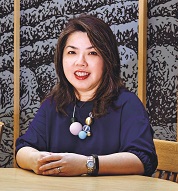
Making our values explicit allows people both from within and outside the NUS community to better understand what we
stand for.
Mrs Ovidia Lim-Rajaram, NUS Chief Communications Officer
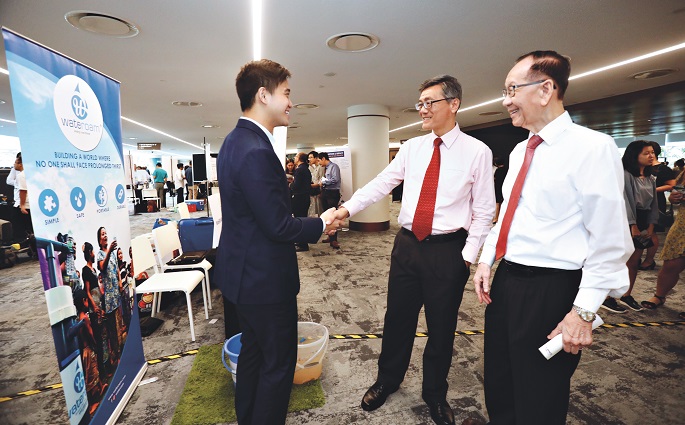 Mr Lim (left) welcoming NUS President Prof Tan (middle) and former NUS Vice-Chancellor Prof Lim Pin to WateROAM’s booth at the exhibition.
Mr Lim (left) welcoming NUS President Prof Tan (middle) and former NUS Vice-Chancellor Prof Lim Pin to WateROAM’s booth at the exhibition.
INNOVATION AND IMPACT
As part of the VMV launch on 15 August, a special showcase of innovative and impactful NUS projects was held at the event venue. On display were over 20 projects by corporate laboratories, start-ups, schools and student initiatives — all of which are, in their own ways, effecting change for the better. Among the featured start-ups was WateROAM, founded in 2014 by three then-undergraduates at NUS with a mission to end rural thirst and unsafe water consumption worldwide through its award-winning, patented water filtration systems. Mr Lim Chong Tee (Engineering ’16), co-founder and Chief Marketing Officer of WateROAM, was present that day and participated in the on-stage launch of the VMV.
![]()
“As a start-up borne out of NUS, the values that WateROAM abides by — such as innovation and integrity — are intrinsically linked to our education at NUS. I feel that the new VMV is key in uniting students and other stakeholders to take on the challenges of the world.”
Mr Lim Chong Tee
NURTURING ADULT LEARNERS
NUS, being a leading global university, is widely regarded as a pioneer in the development of new educational initiatives to equip students with the necessary competencies and strengths to succeed in the workforce. The University is currently making headlines with its orientation towards continuing education and training (CET), as manifested by the recently-launched NUS Lifelong Learners (NUS L
3) and CET500 programmes.
Open to alumni as well as the general public, NUS L
3 provides skills-based and industry-relevant courses to enable professional upgrading in the digital age. On the corporate side, CET500 offers customised course catalogues and training opportunities for individual companies. “The objective of these lifelong learning programmes is to help individuals be more competitive or resilient in the job market, so that they are ready to adapt to the fast-changing workplace environment,” says Prof Ho.
Besides investing in new programmes, another way of concretising the VMV is by tweaking the University’s existing practices and policies. Prof Ho explains, “We will use the new VMV to guide our recruitment and appraisal of faculty and researchers, as well as our selection of students for scholarships and discretionary admissions. That means retooling the interview process and posing questions to ascertain how well-aligned an individual’s values are with NUS’.”
CREATING IMPACTFUL RESEARCH
In the research arena, the University hopes to accelerate the translation of its research projects into societal and economic benefits. Notwithstanding the Government’s efforts to raise the innovation ecosystem in Singapore by improving connectivity, offering research grants and setting up business incubators, Professor Freddy Boey (Engineering ’87), Senior Vice President (Graduate Education & Research Translation) of NUS, believes more can be done to boost the number of researchers.
“It is unreasonable to expect that all innovators will succeed in commercialising their research; in fact, most of them will fail. Thus, a sizeable number of people is required to ensure that, out of them, some will go on to achieve success,” says Prof Boey. “Because universities harbour such a big pool of highly technical and scientific talent, we can act as a sustainable conduit to make this happen.” To this end, a new initiative called the NUS Graduate Research Innovation Programme (GRIP) was unveiled on 4 September.
Under NUS GRIP, the University will commit $25 million over the next five years to help its graduate students, post-doctoral fellows and researchers establish up to 250 deep-tech start-ups in critical areas such as artificial intelligence (AI) and biomedicine. The programme is managed by the NUS Industry Liaison Office (ILO), which Prof Boey heads. “I see ILO as being akin to a hatchery that produces as many small fry as it can, in the hopes that some of them will grow into big fish, or successful companies,” says Prof Boey. His aspiration for NUS? “To become one of the world’s foremost university-based incubators.”
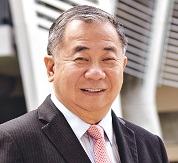
Because universities harbour such a big pool of technical and scientific talent, we can act as a sustainable conduit to make [innovation] happen.
Prof Freddy Boey, NUS Senior Vice President (Graduate Education & Research Translation)
PROMOTING ENTREPRENEURSHIP REGION-WIDE
Even before the rollout of the new VMV, a well-functioning enterprise ecosystem was already in effect at the University through its entrepreneurial arm, NUS Enterprise. Two of its most acclaimed initiatives are the NUS Overseas Colleges (NOC) programme and the BLOCK71 start-up incubator, which have birthed notable homegrown ventures like Carousell, ShopBack and honestbee. At present, there are 11 NOC locations and four BLOCK71 hubs in major cities worldwide.
“The VMV dovetails nicely with the work we have been doing up to now, and it validates the fact that entrepreneurship is an important dimension of NUS’ teaching and research,” says Dr Lily Chan, CEO of NUS Enterprise. “We have built a vibrant, one-stop-shop entrepreneurial community and infrastructure to cultivate our growing start-ups. Even if our students don’t succeed, by participating in our programmes and community, they can acquire skills such as resilience and innovation — traits which are beneficial to any job or industry, and embraced by the VMV.”
v1.jpg?sfvrsn=e3720819_2)
Moving forward, NUS Enterprise plans to strengthen its regional university network in line with the VMV’s pivot to Southeast Asia. Local and international students with an interest in entrepreneurship will have more opportunities to mingle, either in Singapore via the NUS Enterprise Summer Programme or through summer internships abroad. New collaborations have also been forged with public- and private-sector agencies to advance industries of strategic value to Singapore, such as cybersecurity and maritime; leveraging on its BLOCK71 concept, NUS Enterprise will take a whole-of-campus approach to explore innovative solutions to industry pain points.
“We want to see more young people taking risks and pursuing their entrepreneurial passions. We want them to be more daring in coming up with new business or technology innovations, and creating new companies,” says Dr Chan. “This in turn will spark a multiplier effect, emboldening others around the region to enter into entrepreneurship.”
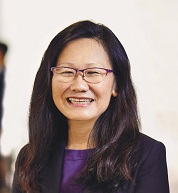
We have built a vibrant, one-stop-shop entrepreneurial community and infrastructure to cultivate our growing start-ups.
Dr Lily Chan, CEO, NUS Enterprise
INNOVATION IN PRACTICE
There is no shortage of innovative work being performed by the NUS researchers. For example, Dr Jiashi Feng (Computing ’14), Assistant Professor at NUS Department of Electrical and Computer Engineering, has led the development of a large-scale, AI-based facial recognition model. To be adopted by Singapore’s Ministry of Home Affairs, it will enhance homeland security and contribute to the Smart Nation vision. Another team helmed by Professor Barbaros Özyilmaz, Deputy Director (Translation) of NUS Centre for Advanced 2D Materials, has invented new manufacturing procedures and applications for graphene, a novel material comprising an atomically-thin sheet of carbon.
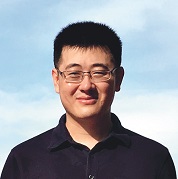
“Innovation means thinking about a problem from a totally different angle, and coming up with a completely new solution to create transformative change for society at large.”
Dr Jiashi Feng
v1.jpg?sfvrsn=f3e4eed8_2)
“The possible applications of graphene, ranging from making supercapacitors to cultivating synthetic bone tissue, are limited only by the imagination.”
Prof Barbaros Özyilmaz
LOOKING INWARD
Lastly, the new VMV will serve as a launch pad for NUS to review its internal governance and management practices, and look for ways to achieve ever-higher levels of excellence. This is part and parcel of its transition in 2006 from a statutory board to a corporatised, autonomous university — a move which gave NUS, along with other publicly-funded universities, greater flexibility to strategise, innovate and differentiate itself in the competitive global higher education landscape.
“Just as companies must adapt quickly to opportunities and challenges in the business environment, so must universities. I hope to change the culture of administration at NUS and cultivate a more responsive, bolder, risk-taking mentality,” says Prof Tan. “Total transformation, internal and external, is what we are after.”
RESILIENCE IN PRACTICE
Mr M. Thirukkumaran (Computing ’18), 26, recently graduated from NUS as class valedictorian, capping a journey that saw him rise above one obstacle after another. As a child, he had performed poorly academically and came close to dropping out of school. It was his Secondary 3 Mathematics teacher’s patient coaching and belief in him that gave Thiru the confidence and desire to turn things around. Through hard work and a refusal to give in to labels like “stupid”, he eventually aced his A-Levels and was awarded a scholarship by the Ministry of the Environment and Water Resources to study at NUS.
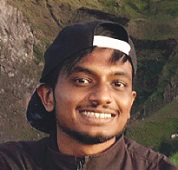
“Resilience is a skill — and like any skill, you improve the more you use it. The struggle of making it to junior college sowed the seeds of a never-say-die attitude, which I have continued to develop since then.”
Mr M. Thirukkumaran
THE PROOF IS IN THE PUDDING
So where do NUS alumni fit in all this? Do they have a special role to play in disseminating the VMV? By virtue of their size alone — they number about 300,000, dwarfing NUS’ 40,000 students and 10,000 staff — the answer is a resounding ‘yes’.
According to Prof Ho, fellow alumni can contribute in two ways:
- They can act as NUS brand ambassadors. “As good role models in the workplace and the wider community, they can show to the outside world the pride that comes with being from NUS.”
- They can give back to the NUS community. “As donors, our alumni can give financially-disadvantaged students a chance to receive and benefit from a first-rate education at NUS, like they did.”
Mr Benjamin Tan (Business ’00), an NUS Alumni Advisory Board member, points out that the VMV’s universality makes it applicable to local and overseas alumni alike: “The VMV may be especially pertinent to our University’s interests, but by no means is it uniquely rooted to NUS. Applying the VMV into our own lives as aspirational guiding principles will equip us to become better global citizens, and well-placed to succeed not just at home but internationally.”
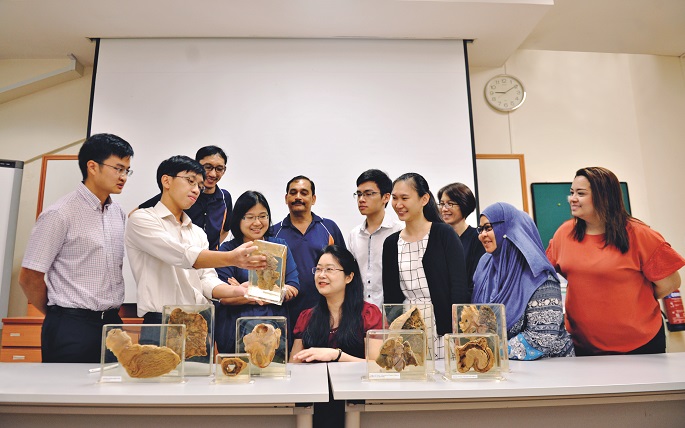 Assoc Prof Nga (seated) with her team of staff, junior doctors and students who have helped build Pathweb.
Assoc Prof Nga (seated) with her team of staff, junior doctors and students who have helped build Pathweb.
EXCELLENCE IN PRACTICE
One quality that has helped Associate Professor Nga Min En (Medicine ’98) from NUS Yong Loo Lin School of Medicine throughout her nearly 20-year teaching career is empathy. Such appreciation for the stresses and challenges faced by medical students and junior doctors prompted Assoc Prof Nga to set up in 2017 the globally popular online pathology teaching resource, “Pathweb”. It has two main components: a virtual museum comprising digitised, fully-annotated specimens of diseased body parts; and a self-directed learning resource containing interactive elements such as mind maps and quizzes. For this and other accomplishments, she has received multiple teaching excellence awards.
![]()
“To me, excellence is the attainment of a high standard of performance that goes beyond standard measurables, so as to make a meaningful impact and a positive difference to others. It involves trying one’s best and engaging in continual self-improvement.”
Assoc Prof Nga Min En
A CALL TO SERVICE
Whether it be in education, research or entrepreneurship, NUS’ VMV aims to achieve transformational change, which by its very nature demands a future-oriented outlook. A look back at its past vision statements indicates just how far the University has come. In the wake of Singapore’s formation as an independent republic in 1965, successive NUS Presidents stretching from the late Dr Toh Chin Chye (1968–1975) to Professor Lim Pin (1981–2000) busied the University with contributing to the nation-building effort.
Things changed when Professor Shih Choon Fong (2000–2008) took over the mantle at the turn of the millennium. Under his presidency, NUS sought to become “the intellectual and entrepreneurial pulse of Singapore” and “a global knowledge enterprise” through fresh approaches to education, especially science. His successor Prof Tan Chorh Chuan (2008–2017) set NUS’ sights on becoming “an international university with a unique Asian flavour” in order to address issues faced by the rising continent, such as urbanisation and environmental sustainability.
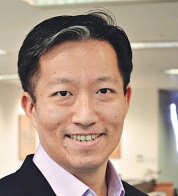
Applying the VMV into our own lives as aspirational guiding principles will equip us to become better global citizens, and well-placed to succeed not just at home but internationally.
Mr Benjamin Tan, NUS Alumni Advisory Board member
At the end of the day, however, there is one throughline that binds the various visions, including the new VMV, together: the emphasis on improving people’s lives, be they near or far, or for current or future generations. This overarching purpose harkens all the way back to the founding of NUS in 1905 as a medical school “by the community, for the community”. So in a way, the more things change, the more they stay the same.
RESPECT AND INTEGRITY IN PRACTICE
Since leaving NUS, Mrs Carmee Lim (Science ’63) has carved out a distinguished career in the education profession. The 78 year-old is perhaps most well-known for her former tenure as Principal of Raffles Girls’ School from 1988 to 1999. As Principal, she led by example while instilling respect and integrity in her students — values which had been cemented during her undergraduate days. Mrs Lim treated everyone equally, from the teaching staff to the coffee lady, and all were included in school functions. She also regularly exhorted her pupils to do the right thing, even when nobody was looking at them.
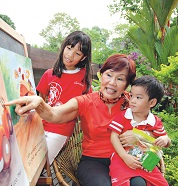
“NUS is a great university, and a gateway to boundless learning experiences. As alumni, we must inspire others to make the world a better place in our own distinctive ways.”
Mrs Carmee Lim